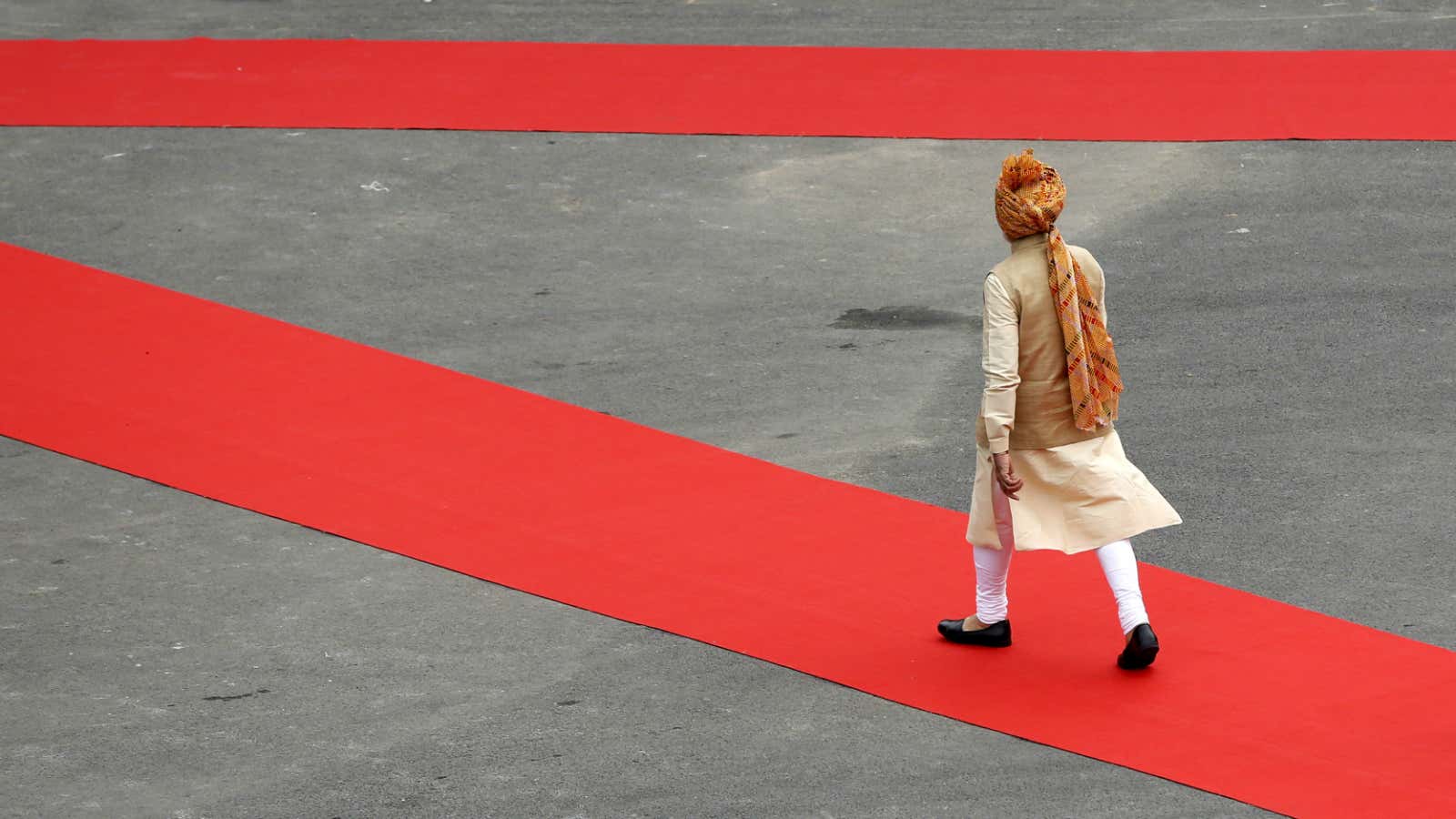In the beginning, there were only doubts. Doubts over how India’s secular fabric would hold up under a government led by Narendra Modi.
Then, there was a flicker. In December 2014, the Bharatiya Janata Party (BJP) member of parliament (MP) Niranjan Jyoti asked voters in Delhi to choose between “Ramzadon” (those born of Ram) and “haramzadon” (illegitimately born). In January this year, another BJP MP, Sakshi Maharaj, implored Hindu women to have at least four children to help “protect” the religion.
That flicker then became a fire. On the night of Sept. 28, a 50-year-old Muslim man was lynched in Uttar Pradesh’s Dadri village on the mere suspicion of having stored beef in his house.
It was the bloodiest manifestation of India’s renewed appetite for politicking over meat, which gained momentum after Maharashtra’s BJP-led government sought to impose a four-day meat ban in September. It was also the last straw for many Indians—authors, poets, filmmakers and scientists, among others—already shaken by the assassinations of rationalists MM Kalburgi and Govind Pansare.
Now, the fire is threatening to become an inferno that could engulf Modi’s economic and development agenda unless it is swiftly and decisively doused.
On Oct. 29, Moody’s Analytics—subsidiary of Moody’s Corporation, which also houses the eponymous credit rating agency—warned that “Modi must keep his members in check or risk losing domestic and global credibility.”
The report explained:
…in recent times, the government also hasn’t helped itself, with controversial comments from various BJP members. While Modi has largely distanced himself from the nationalist gibes, the belligerent provocation of various Indian minorities has raised ethnic tensions. Along with a possible increase in violence, the government will face stiffer opposition in the upper house as debate turns away from economic policy.
Moody’s isn’t the only observer critical of the prevailing environment in India.
“The reality today is that there is considerable fear in the minds of minorities in India,” Infosys co-founder N R Narayana Murthy said on Oct. 31. “There is considerable fear in the minds of people of one region living in another region, for example like we had in 1967, when south Indians were treated very badly by Shiv Sena in Mumbai—today there is a lot of that worry.”
Not only is 69-year-old Murthy perhaps the first Indian business leader to speak out, but as one of the pioneers of India’s powerful, global-facing software industry, his is also an influential voice that is often carefully heard and considered abroad. And more industrialists, like Biocon’s Kiran Mazumdar Shaw, have subsequently echoed Murthy.
“… No country has made speedy economic progress unless there is no strife, there is no distrust, there is no fear, unless the majority community does not oppress the minority community, does not want the minority community to do what it wants,” Murthy told NDTV.
Even some within the government are asking hard questions.
Reserve Bank of India governor Raghuram Rajan, speaking at a convocation ceremony at the Indian Institute of Technology-Delhi on Oct. 31, talked about the “the right to question and challenge, the right to behave differently so long as it does not hurt others seriously.”
“Should ideas or behaviour that hurt a particular intellectual position or group not be banned?” he asked. “Possibly, but a quick resort to bans will chill all debate as everyone will be anguished by ideas they dislike. It is far better to improve the environment for ideas through tolerance and mutual respect.”
And there is perhaps no Indian leader who has lately spoken of the need for tolerance more than president Pranab Mukherjee.
“Multiplicity is our collective strength which must be preserved at all costs. It finds reflection in various provisions of our Constitution,” Mukherjee, a former Congress party stalwart, said on Oct. 31. In fact, Modi’s first public comment on the Dadri incident last month drew heavily from Mukherjee’s preceding remarks.
Yet, neither Modi nor his government has been able to effectively placate fears over this rising wave of intolerance. They have either resorted to silence or retorted by labelling much of this disaffection, particularly among the intellectual classes, as a “manufactured revolt”.
That strategy may likely prove unwise, especially as Modi’s economic agenda comes under threat.
The prime minister’s once-celebrated communications apparatus, as Quartz previously argued, has failed Modi more than once in recent months. This time, too, the government may be forced to sidetrack its focus on urgent and important reforms, unless it is able to forcefully clarify its stand on the current climate of fear and discrimination in India.
It is time that Modi leads from the front, shunning the rhetoric and elevated stages of election rallies and diaspora receptions, to speak directly and honestly to those losing faith in his government. Instead of fronting his ministers, perhaps he needs to take questions directly and answer them convincingly. Time for his first proper press conference, maybe?
We welcome your comments at [email protected].
